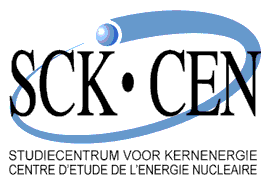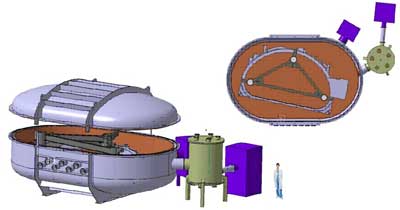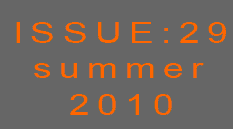

New stage in the development of fusion technology
SCK•CEN signs major research contract
In 2009, Belgium decided to actively participate in the international fusion programme "Broader Approach", with the Belgian Nuclear Research Centre, SCK•CEN, playing a leading role for Belgium. As a result, on 9 June, 2010 SCK•CEN signed a major contract with ALM Sclessin (Ateliers de la Meuse SA, in Sclessin, near Liège). ALM will construct a cryostat, a large stainless steel tank capable of keeping extremely low inside temperatures (-269 °C) while maintaining an ambient outside temperature. This reservoir will be used to perform cold tests of powerful superconducting magnets for a fusion reactor located in Japan (JT-60 SA). These cold tests will be conducted in France. ALM will also supply specialised accessories, including a system of vacuum pumps and a cryogenic valve box.

The scientific challenges in fusion technology are huge: the temperature in a fusion process is close to absolute zero in the magnetic coils surrounding the vacuum vessel to hundred million degrees in the heart of the plasma. The development of structural materials to withstand the extreme conditions present in the vessel is one of the great technological challenges that we face today.
ITER and the Broader Approach
The ITER project in Cadarache (southern France) is a collaborative venture between seven partners (including the European Union). Following the decision to build ITER in Europe it was decided to set up a "Broader Approach" R&D programme on fusion in common with Japan. It aims to develop technologies and research for the production of fusion power that cannot be performed in ITER. This programme is based on a voluntary contribution of various European Member States.
The role of SCK•CEN
In the spring of 2009, Belgium officially committed itself to participate in the three main projects of the “Broader Approach” (the IFMIF project, the upgrade of the JT-60 SA Tokamak and the IFERC/DEMO project). Belgium's three national regions are involved in the project, providing a total budget of 11 million Euros over a six to seven year period. SCK•CEN is the project coordinator for Belgium. Also other research centres, universities and companies are participating in this international R&D programme based on technological excellence.
SCK•CEN participates directly in two projects. The first is the design and validation of the irradiation facility IFMIF (the International Fusion Material Irradiation Facility). This plant, which will produce high-energy, high-intensity neutrons, is required to test materials in similar conditions as the ones that will occur in future fusion reactors. IFMIF should be ready by 2025, when ITER should also be operational. IFMIF will give essential information for the construction of power generating fusion reactors beyond ITER. SCK•CEN is responsible for the irradiation testing of sensitive components of the IFMIF, for the design of a test module for the start-up of IFMIF and for the design of the so-called low-flux test module. In 2009 SCK•CEN experts designed the vessel for irradiation testing, the basic design of the start-up test module and prepared the low-flux test module. As a result of these activities Belgium is actively participating in the design of IFMIF.
In addition, SCK•CEN has also participated in a research project called DEMO, which is looking into the materials that will be used in a future fusion power plant. The launch of this plant is not expected before 2050.
Nuclear fusion within SCK•CEN
SCK•CEN has been developing expertise in this field for over twenty years. Its current research focus mainly on four areas:
-
the effects of radiation on materials, components and robotics equipment
-
the development of appropriate instrumentation and irradiation devices
-
plasma wall interaction studies
-
the social and economic aspects of fusion in the energy mix
For more information, contact Vincent Massaut at: vincent.massaut@sckcen.be
|

